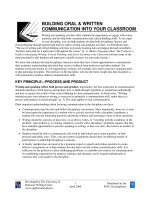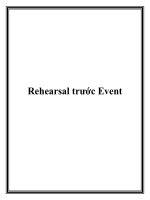‘Preparing Your Event’ doc
Bạn đang xem bản rút gọn của tài liệu. Xem và tải ngay bản đầy đủ của tài liệu tại đây (70.39 KB, 11 trang )
‘Preparing Your Event’
Preparing your Event - Checklist
The success of an event is, mostly, the result of careful and
thorough project planning. However, this takes time and effort,
often a luxury in the busy schedules of family life and work. This
pack is designed as a basic checklist, to help you with your
planning, and includes:
• Project Management
• Venue
• Accessibility
• Health & Safety
• Insurance
• Facilities
• Performers/Speakers/Guests
• Equipment
• Costs & Budgets
• Publicity
• Preparing a Press Release
• Evaluation
• Useful Contacts
Project Management
Planning an event is really a timetabling exercise where the
various tasks are laid out against their deadlines. Preparing a
timetable will give you a good visual overview.
If you are planning this event with others, make sure that everyone
knows their roles and responsibilities throughout the planning
exercise and on the day.
If you are on your own, try to delegate tasks to others in your
group or organisation and ask them to let you know the outcome.
Ensure that communication within your group is clear and regularly
updated. Don’t assume that others can read your mind!
Venue
Confirm booking early and in writing.
• Date, time, exact room, who will be in attendance and when you
need to vacate.
Make sure you confirm:
• Full address, contact person and phone numbers.
• That you will be able to use the building for the intended activity
(e.g. private room for massage, dressing rooms for fashion
show…)
• The numbers of chairs, tables and other items available, type of
lighting, layout of rooms.
• Hire cost and what you will get for your money (tables and chairs
arranged…)
Details of Council owned buildings and the booking procedure are
available at
Accessibility
Discuss accessibility issues with the venue manager such as:
• access for wheelchair users (ramp, lift)
• disabled parking
• hearing induction loop
Do you envisage participants with any accessibility needs e.g.:
• Support workers for participants with disabilities.
• British Sign Language interpreter
• Language support (Urdu, Punjabi, Gujerati). If so, ensure that you
allow for this cost in your budget.
• Will you need to provide transport to facilitate access to some
participants (e.g. older people)? If so, ensure that you allow for this
cost in your budget.
For any information and advice on Community Language and BSL
Interpreter contact:
Community Language 01484 223326
Health & Safety
• Ensure that you have access to a first aid kit.
• Ensure that you are aware of where fire exits are situated.
• Ensure you know how to reach the caretaker or duty manager
easily in case of an emergency.
For first aid cover for outdoor or indoor events contact:
Neil Marsay, St John Ambulance 01924 262726
www.swy.sja.org.uk
Insurance
Public liability insurance will cover you in the event that a member
of the public is injured and the accident is deemed to be your fault.
The hirer / organiser must provide evidence of Public Liability
insurance. It is up to the organiser to assess the insurance risk
associated with other providers that are 'subcontracted' such as
performers, therapists, sports/exercises trainers, etc…
• Voluntary & Community Groups should have their own public
liability cover to cover their activities.
• Commercial stalls, registered as a business and trading at the
event, need to have their own public liability insurance.
• Therapists and practitioners need to have their own public liability
insurance.
• Performers (such as a stilt walker) need their own public liability
insurance.
• Artists such as singers, poets, musicians should really have
cover and they would be advised to take it out/ see if they have
cover via their household policy. The risk in this instance will be
very low and they may be happy to take the chance.
• Individuals who are trading may have public liability insurance on
their household contents policy and they should check with their
insurer to ascertain if this is the case. If not they are strongly
advised to take out cover.
• The council will provide cover for liabilities arising from their own
building defects and any negligence exhibited in its organisation.
Kirklees will accept any liability if its technicians set anything up
incorrectly and this leads to an accident. The authority cannot
provide liability cover to individuals.
For quotes on required cover, please contact insurance providers
such as Zurich Municipal, Ecclesiastical…
Community Trading Services Ltd can also give general advice on
insurance matters, 020 7837 7887
Facilities
Childcare
Crèche facilities are popular as they allow parents/carers to fully
benefit and enjoy the activities/performances. However when
booking childcare services, do so from registered organisations,
check their requirements and budget the costs.
For any information & advice contact Child Information Services
01484 223041/2 Email:
Children welcome
Some events cater for the family and therefore welcome children,
however make sure specific activities are laid on for the children.
Refreshments
Refreshments are a sign of conviviality and are always welcomed
by participants. You can make a small charge per drink to cover
the cost.
Food
Most venues will allow you to bring food on the premises, however
for food safety reasons new regulations are progressively being
implemented.
• Check with the venue managers that you are able to bring food
into the building.
• Ask about kitchen facilities and access (hob, microwave, boilers,
sink & taps, hand washing…).
• Ensure you are aware of the basic food hygiene and temperature
control regulations.
For any information & advice contact Food Safety Section, 01484
226452 Email:
Performers/Speakers/Guests
Book early and confirm booking closer to the date:
• Send in writing details of venue, map, time, content of
performance / lecture / etc, fee if any.
• Check your guest/speaker/performer requirements such as
equipment, sound, lighting, refreshments, transport etc.
• Always ask for written confirmation on any mail you may have
sent or verbal agreement made.
Equipment
• Check what equipment is available to you, the booking procedure
and if there is a cost involved e.g. computers, overhead projectors,
data projector, cassette/CD player, etc.
• Check you are able to bring equipment into the building. Any
electrical equipment that you provide may need to be checked by a
certified person prior the event, for safety reasons.
Costs and Budgets
It is important to keep detailed accounts of your event so you can
have a clear picture of where your money is going. If you have
obtained funding for your event, detailed accounts, invoices and
receipts are essential so the funding body can monitor it. Find
below a few examples of cost items.
Publicity
What we can do to promote the event?
• Distribute this publicity material to a wide range of outlets.
• Advertise your event in the bi-monthly What’s On guide
• Advertise your event on the Kirklees website -
What can you do to promote your event?
Advertise your event on the Kirklees website by going to
and entering the details of your event as instructed
This will get your event publicised FREE on the Events pages of
the Council Website and, subject to space, a FREE listing in the bi-
monthly What's On guide which is published in conjunction with the
Huddersfield Examiner and Dewsbury reporter Series and is
distributed to a readership of over 150,000.
If you want to attract a large audience you may want to take out a
small advertisement in this guide to give your event a higher profile
in which case see
for details of sizes and costs.
How to let people know about your event?
DON’T expect people to flock to your event if you rely on a poster
and some leaflets displayed at the venue.
WHY? You will only reach a small audience and miss the
opportunity of attracting more people to your event.
DO get information about your event out into the community.
WHY? Think of all the people who pass through the following
buildings/organisations in your area every day:-
• Post office
• Doctors, family clinics
• Nursery groups
• Churches/mosques
• Local shops, hairdressers
• Youth clubs
• Community centre / Village halls
• Women’s Organisations
Think of all the people who read local newsletters, such as:-
• Tenants & Residents Association newsletters
• Local community newsletters
• Parish Council bulletins
Bear in mind that these publications will all have deadline dates for
print, some may be monthly, others may be bi-monthly etc. It is
advisable to find out in advance what deadline date by which they
require information.
Specific Guidelines when producing your own publicity material
Use of Plain English
• No jargon
• No abbreviations
• No acronyms
People need clear information that tells them WHAT, WHERE and
WHEN.
Use of inclusive language
• Phrases such as ‘all welcome’ ‘come along with a friend’ ‘to find
our more information contact……’ and ‘all welcome’.
State facilities/access
• Can parents bring young children?
• Is there wheelchair access?
• Will there be refreshments?
Use of images
If you use images of people, use positive images that reflect your
target audience i.e. multicultural, disabled, young/old, male/female
etc. Most importantly however, you should obtain the consent from
the subjects concerned before using their photograph for public
release.
Key inclusions in posters/flyers
• Name of the event
• Venue
• Date and time
• Contact number
• Access facilities
• Entrance fee, if any
Sounds obvious, but often vital information is missed.
Preparing a Press Release
There are perhaps three main types of local story – News,
Features, and Listings
News
A news story is one that is usually linked to a new piece of
information, a one off event, or a story linked to a specific date
Examples: a forthcoming event, opening a new building or facility,
launching a new service, a problem affecting local groups, a
celebrity visiting/endorsing a local event.
Features
There are perhaps two different types of feature – human interest
and analytical:
Human Interest
A profile of a “special” person, a personal story, a family’s
experience, anything that is central to the experiences of people
that other people can relate to. Typical themes cover, success,
triumph over tragedy, record breaking, oldest, youngest, longest,
shortest etc.
Analytical
Articles, which are survey based, research based or statistically
based and which can be approached from a factual or opinionated
viewpoint.
Listings
A listing is sought when you want to promote a forthcoming event
in the “diary” or “events” section of the media.
Features are perhaps more difficult to achieve than news, as you
have to capture the imagination of the editor to convince that it is
something they can develop to interest their readers.
News is more obvious and immediate, but there is still an art to
selecting the newsworthy angle.
If you want an event covering, then the media need to know in
advance so they can send a reporter. They are much less likely to
cover an event in retrospect.
Some pointers
• Head your page “Press Release”
• Cover all the basic details by answering the questions Who What
Why
Where When and How
• Don’t bury the story – make your newsworthy points in the
opening paragraph and expand later
• Use plain English – NO jargon, NO abbreviations
• Try and limit your release to one side of A4 – follow up with
background information if necessary under the heading “Notes to
the Editor”
• Use acronyms only after you have first used the full title followed
by the acronym in brackets
• Keep your layout as simple as possible – use double spacing and
wide margins if you can
• Always include contact name, address, email address and
telephone number
• Date your release and always (if appropriate) make sure any
embargo date is clearly stated.
• Send relevant photographs if at all possible (Don’t expect them to
be returned)
• Try and get another person to proof read your press release,
preferably an “outsider” – if they don’t understand it, then it is
unlikely anyone else will.
Evaluation
If you have obtained a grant from Kirklees Council for this event
then you will have to provide an evaluation/assessment of your
event to the funding body. It is always easier to collect evidence as
and when the event takes place rather then afterwards.
• Visual Evaluation
You can collect visual evidence such as photographs or video.
However make sure that you ask permission before taking photos
or filming participants.
• Written Evaluation
You can collect written evidence through a comment board or
book. If you wish to do so, ensure you have thought of the
equipment needed, where to place the board/boxes and remind
people before they go. In a large event, you would need somebody
by the door to catch participants as they leave.
• Audio Evaluation
You can collect audio comments, by going round with a tape
recorder, which can then be edited in text.
Useful Contacts
The Kirklees Directory of Voluntary and Community Organisations
is full of useful contacts. All libraries have a copy which lists
address and telephone details as well as a brief description about
each organisation.
Also available on the Kirklees website









